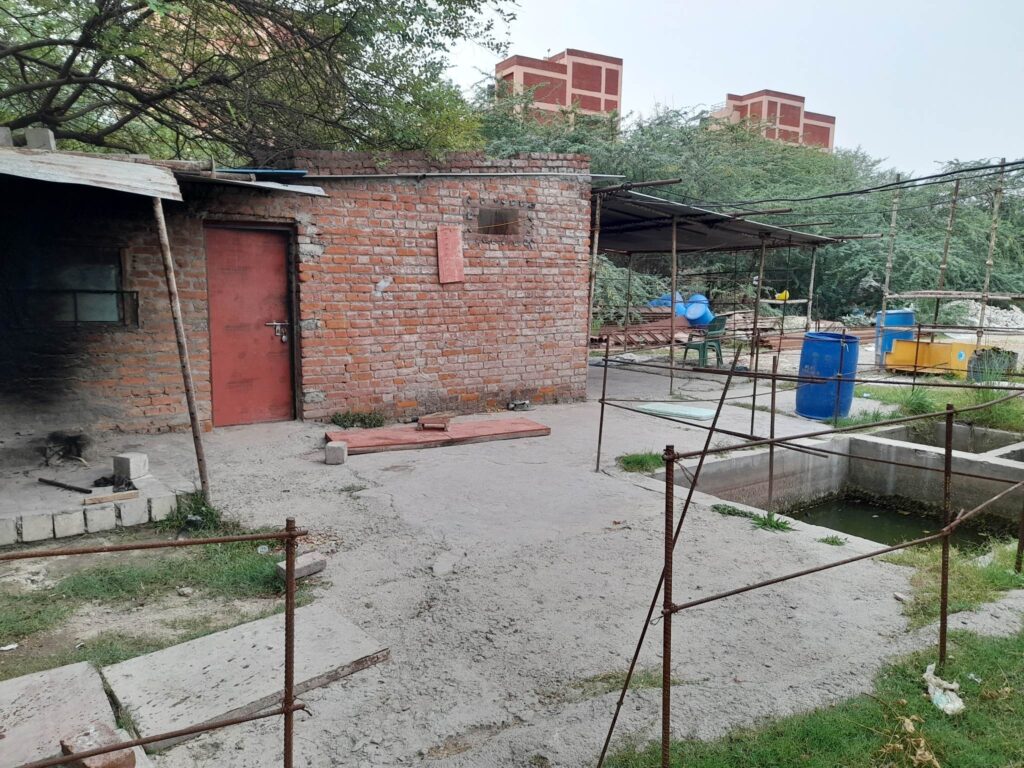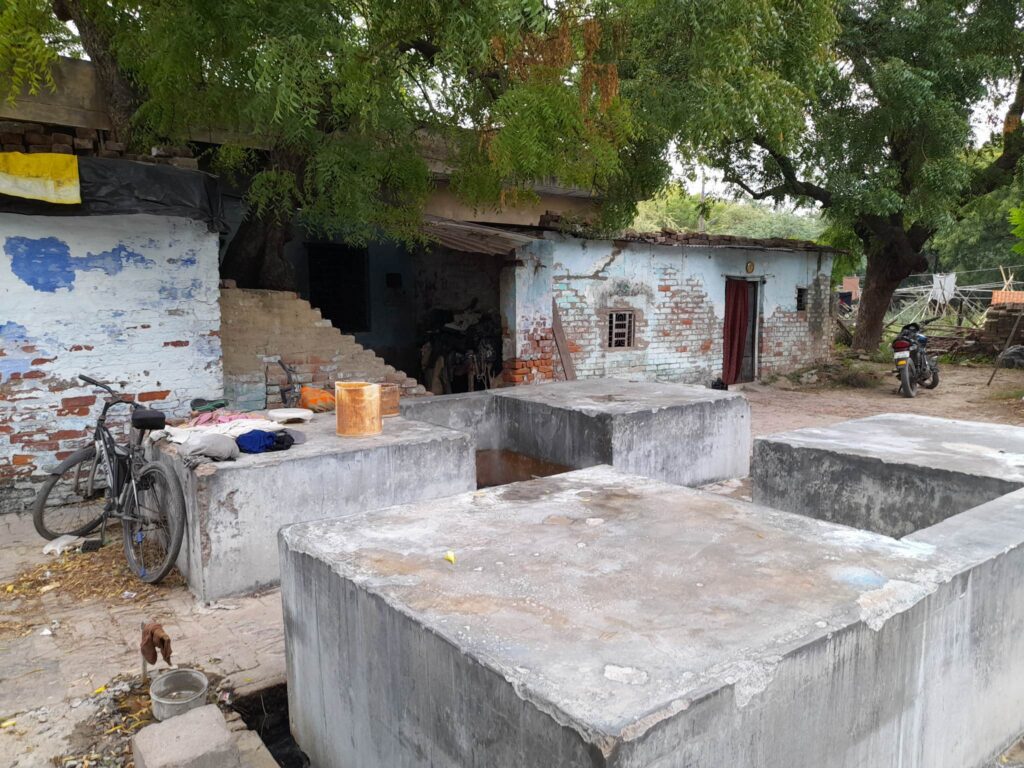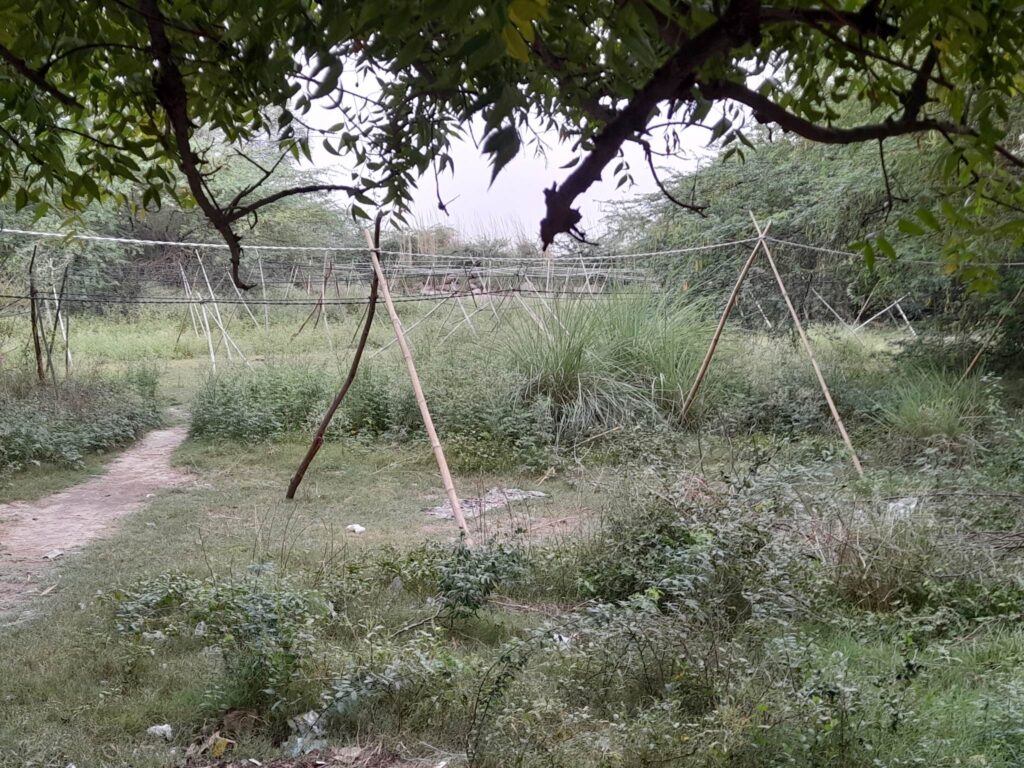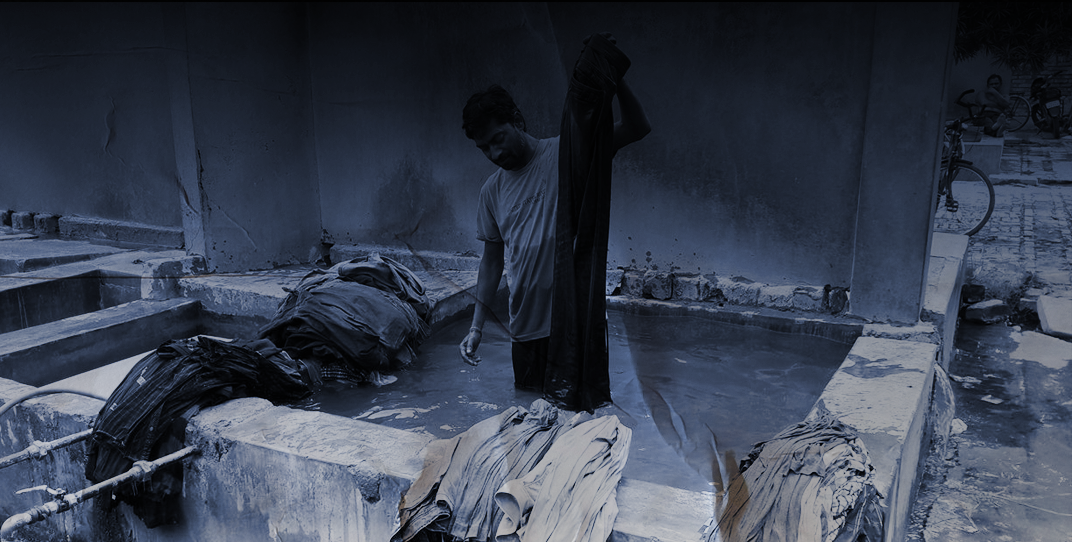In light of a sequence of compelling events, Vox was prompted to pay a visit to the Dhobighat- an area on our campus rarely explored by students. The stark contrast to our well-developed and meticulously maintained surroundings left us feeling strange. Half-ruined buildings on the verge of collapse, overgrown grass towering above us- reaching our height, congested and dimly lit surroundings- an encounter with an entirely different world hidden within our own campus



“We serve over 5000 students, 6000 if you include faculty, staff, and others” claimed a Dhobi. The campus currently houses well over 9000 students, catering to the laundry needs of more than half the student population. Their door-to-door services (washing and ironing) streamline our daily routines, sparing us the time and effort required to tend to our clothing. The large number of students using the services provided by Dhobis is evidence of the strong preference students have for the Dhobi’s services.
The other alternative is – you guessed it- the washing machine.
Most students prefer not to use washing machines for a number of reasons. When one loads a bunch of dirty clothes in their laundry bag to leave for the washing machine room, the fear of not finding an empty, clean, and usable washing machine is a real concern. During the washing, one has to pay multiple visits to ensure the machine is still working and has not stopped abruptly midway- as is common. Afterward, you have to dry as well as iron your clothes. For a student, this process takes a significant amount of time to complete. Not to mention, the washing machines in every hall are in abysmal numbers. There are around 4-5 machines in a hall for hundreds of residents.
In addition to that, the machines we are provided with are domestic washing machines and not commercial ones. Over time, the daily, relentless loads take their toll and cause domestic washing machines to succumb to inevitable faults. This is the state of things considering more than 50% of students don’t use washing machines yet (as per the number Dhobis claim). Adding additional washing machines to the halls also appears highly unlikely due to the limited funds allocated to the HEC. Each washing machine comes with a hefty price tag, making it difficult to increase their numbers.
On the contrary, a dhobi offers a door-to-door service of not only washing your clothes but also drying and ironing them, in which virtually no time is lost at the cost of 250-500 (varies individually) rupees per month. For many, the washing machine alternative is daunting. But even if we were to assume that somehow, we will have fully functional commercial-grade washing machines and students with the grit to maintain them, the biggest problem is still the amount of time and passive effort it takes to use these machines.
However- and you are probably unaware of this fact- Dhobis have been asked to vacate campus premises multiple times over the last 15 years and something similar is happening at the moment. The primary argument by the administration is related to the legality of their residency(covered later in the article). They claim that the leases for their residences were originally issued under the names of their fathers, who have since passed away. As a result, these leases are now deemed invalid, rendering their current occupation illegal. Further, as the institute is growing, there is a need for land to build new infrastructure. The dhobi ghat, they believe might serve as land for upcoming infrastructure For more background refer to – https://voxiitk.com/iitk-home-no-more/
With this context in mind, it becomes imperative for us to reflect on our role in the scheme of things-
As students , Dhobi’s service directly caters to our laundry needs, without any intermediaries involved. This makes us their primary customer, and so one of the principal stakeholders. The potential impact of whether or not Dhobis stay on campus has a direct bearing on our daily lives. Not only are we the consumers for the Dhobis’ services, but as students of this institute, we are also stakeholders in major decision-making. When the administration deliberates on a matter that could significantly impact our daily life – even the seemingly minor aspect of spending 50-60 minutes on laundry, it makes sense to take into account the implications of such a decision on students.
The Dhobis claim that attempts to evict them from the campus have not just been isolated episodes but a sustained series of subtle coercions. One of these, they say- is the administration’s refusal to grant them access to a basic necessity: a toilet in the workplace. Dhobis have had to defecate in the open spaces right across the Dhobhighat despite the Swachh Bharat Mission followed throughout the nation.
The houses they live in are at risk of collapsing. The Dhobis say that there have been incidents of collapse in the past, causing severe injuries to some. However, the Institute Works Department (IWD) has turned a deaf ear to these concerns and neglected necessary renovations. Overall, the Dhobis describe their situation as an ongoing pattern of neglect and subtle coercion. The episode that triggered the series of events leading to this article was also along similar lines –
Dhobis told us that they were asked by the Estate Office to complete a police verification, following which they would be eligible to receive hall passes. When they went to a nearby police station in Kalyanpur for the same, the concerned policemen clarified that dhobis need not get a police verification done since they are already living inside the campus.
“A few days later,” claims the dhobi, “the police chowki received a call from the Estate Office, who want our passes to be issued only if we are able to produce a residential address outside of IIT.”
The administration has demanded that Dhobis live outside campus, and can continue to serve students like other contractual employees. We asked Dhobis about the feasibility of this idea, Here is what they had to say about it-
“We work around the clock, 24/7.”
6000 customers means a lot, lot of clothes. In order to get clothes washed on time, Dhobis have to work in shifts, so the Dhobi Ghat has to be functional almost around the clock. Dhobis start their work as early as 5 am and work as late as 3 am the next day. Clothes are washed in stages- they are soaked, slammed, cleaned, rinsed, and finally left out to dry. Given a limited amount of space and many clothes, this entire process cannot be completed unless they keep working. This also includes figuring out logistics such as determining the order in which clothes will be left out to dry. If they work as regular employees, they will only be allowed to work for 8-12 hours. They claim it is impossible to wash so many clothes if they are made to work 9-5.
“It’s a family occupation”
The Dhobi is not alone in washing clothes- he is aided by his family. His wife, kids – everybody has a part to play in the washing process. This, they claim- is another necessity to successfully handle the number of clothes they receive. If they are to work as regular employees, only one person from the family will be allowed inside campus premises-which would again, make it impossible to meaningfully finish work in time.
“Students request services at odd times”
The Dhobis tell us that almost every day – there are students who need to get their clothes washed, stains removed, ironed, etc, immediately. They usually get this done by calling their Dhobis, who collect clothes at odd hours and return them the next day. These odd hours look like 1 am in the morning or 9 pm at night. They make the point that not being on campus premises does not allow them to cater to these cases.
“Where will we go?”
Even if the dhobis agree to move outside, they have nowhere to go. They claim they do not have the capital to buy or rent land and/or build a new dhobighat. It’s important to note here that they pay a monthly rent to the institute- for property, electricity, and water. Further, most of them barely attended school and have mostly taken over their Father’s occupations. They told us how they live hand to mouth and how – once evicted, they will not have any means of subsistence- which will affect their services.
Behind the fervent arguments surrounding the legal and utilitarian aspects of the dhobis’ stay on campus, another aspect remains hidden—their relationship to the campus. These individuals, who were born on IIT Kanpur soil and spent their lives living and working on this campus-have seen the ebbs and flows of student life- batch after batch, becoming a part of our collective life here. Forged through interactions and shared experiences, this campus holds for them a sentimental significance.
In 1973, a gang of dakoits launched a brazen assault on our dhobi-ghat. To stop them from plundering students’ clothes- my father endured the searing pain of two bullet wounds—one grazing his cheek and the other striking his leg…and given a chance, I would do the same -remarked one of the many, as washer-folk gathered around us.
History of the issue and the administration
When the Institute was established at its current location, a group of dhobis received an invitation from the founding Director, Prof Kelkar. The dhobis played the role in meeting the laundry needs of the campus residents. In return, they were promised a designated work area with basic amenities, such as a reliable water source, sufficient space for clothes drying and storage, and residential quarters for their families. The premises were officially licensed under the names of the primary male members of each dhobi family. Over the years, as the student body grew manifold, the responsibility was passed down to the subsequent generations, with the children of the original dhobis continuing their families’ occupation. These male members, have since passed away – and their children have not been formally allotted the property by the institute- this is the premise behind the claim of their illegal occupancy.
The administration cites several arguments: first, they claim that the increasing use of washing machines by students has reduced the need for dhobi services; second, they propose making alternate arrangements, such as providing more washing machines or bringing in professional laundry services, to ensure students’ convenience; and third, the administration argues that the space occupied by the dhobis is required for constructing new hostels and infrastructure to accommodate the rising number of students in the Institute, and to relieve the crunch.
“Understanding that there are families living in that area and it will be tough to find another place all by themselves, the campus administration has discussed it with the city administration to help find a shelter for all these families and is also willing to provide any kind of help they would therefore need”– this is a statement from 2018, by professor Manindra Agrawal, who was the Deputy Director at that time. We asked the Dhobis about this episode, and they responded by saying that no such arrangement was made following the promise.
The administration of our institute operates with pragmatism and practicality, running an institute of this magnitude comes with its own set of difficult targets and hurdles. They too are stakeholders in this intricate system, working to meet these targets and fulfilling their assigned responsibilities. Then there is the other part of campus- our working staff: the Dhobis, the Mess workers, sanitation staff, SiS guards, and more. These individuals serve as providers of essential services directly benefiting us- the students, as their consumers. Oftentimes, there are tensions between what the goals of the administration demand vs. the welfare and rights of the working staff on campus. Acknowledging the power dynamics inherent in these relationships, it becomes our responsibility as students- to stand in solidarity with them. After all, we are direct beneficiaries of their daily services, and their well-being closely corresponds to our own.
An Editorial by Vox Populi






![[EDITORIAL] Is the institution failing somewhere?](https://voxiitk.com/wp-content/uploads/2026/01/1-2-768x960.png)




